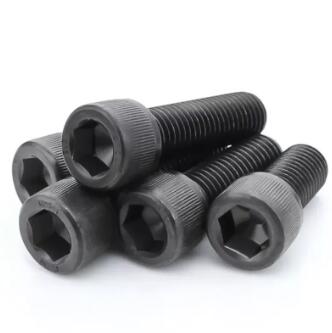How to Choose the Right DIN912 Hex Socket Screw for Your Project
2024-08-26
Choosing the right fastener is crucial for the success of any project, whether it’s assembling a machine, constructing a building, or repairing a vehicle. DIN912 Hex Socket Screws are a popular choice for many applications, but with various sizes, materials, and finishes available, selecting the right one can be a bit daunting. In this blog, we’ll guide you through the key factors to consider when choosing the perfect DIN912 Hex Socket Screw for your specific needs.
Understanding the DIN912 Standard
Before diving into the selection process, it’s essential to understand what the DIN912 standard entails. DIN912 specifies the dimensions, material properties, and mechanical performance of hex socket screws. This standard ensures consistency and reliability, allowing you to choose the right screw with confidence.
Key Factors to Consider When Selecting DIN912 Hex Socket Screws
1. Material Selection
The material of the screw is one of the most critical factors to consider, as it affects the screw’s strength, durability, and corrosion resistance. Common materials used for DIN912 screws include:
- Stainless Steel: Offers excellent corrosion resistance, making it ideal for outdoor and marine applications. It’s also non-magnetic, which can be important in certain electronic applications.
- Alloy Steel: Known for its high tensile strength, alloy steel is suitable for high-stress applications. However, it may require a protective coating to prevent corrosion.
- Carbon Steel: A cost-effective option with good strength properties, though it may be prone to corrosion without proper treatment.
- Titanium: Lightweight, strong, and corrosion-resistant, titanium screws are used in aerospace and medical applications where performance is paramount.
2. Size and Thread Type
DIN912 Hex Socket Screws come in various sizes, including different diameters, lengths, and thread types. The size you choose should match the specifications of your project, ensuring a proper fit and secure fastening.
- Diameter: The diameter of the screw affects its load-bearing capacity. Larger diameters are suitable for heavy-duty applications, while smaller diameters are used in more delicate assemblies.
- Length: The length of the screw should be sufficient to penetrate the materials being joined without extending too far, which could affect the integrity of the assembly.
- Thread Type: Coarse threads are generally better for softer materials and offer quicker assembly, while fine threads are used for harder materials and provide a more secure hold.
3. Coating and Finish
The coating and finish of the screw can enhance its performance and appearance. Common options include:
- Zinc Plating: Provides moderate corrosion resistance and is often used in indoor applications.
- Black Oxide: Offers minimal corrosion resistance but provides a sleek, black finish that’s popular in certain aesthetic applications.
- Hot-Dip Galvanizing: Provides excellent corrosion resistance, making it ideal for outdoor or marine environments.
- Passivation: A chemical treatment for stainless steel screws that enhances their corrosion resistance and removes surface contaminants.
4. Environmental Considerations
The environment in which the screw will be used plays a significant role in material and finish selection. For example:
- Corrosive Environments: In environments exposed to moisture, chemicals, or salt, a corrosion-resistant material like stainless steel or titanium is essential.
- High-Temperature Applications: In high-temperature environments, choose materials and coatings that can withstand thermal expansion without losing integrity.
- Aesthetic Requirements: In applications where appearance matters, such as consumer electronics or automotive interiors, consider screws with a finish that complements the overall design.
5. Load-Bearing Requirements
The mechanical demands of your application will dictate the strength of the screw required. For heavy-duty applications, such as structural engineering or automotive assembly, select a screw with a higher tensile strength, such as one made from alloy steel. For lighter applications, a standard stainless steel screw may suffice.
6. Installation and Accessibility
Consider how the screw will be installed. If access is limited, a longer hex key or a screw with a shallow socket may be necessary. Additionally, think about whether the screw will need to be removed or adjusted frequently, as this could influence your choice of material and finish.
Practical Applications of DIN912 Hex Socket Screws
To better understand the selection process, let’s look at some practical applications:
1. Automotive Assembly: In automotive applications, where strength and resistance to vibration are crucial, an alloy steel DIN912 screw with a zinc plating might be ideal for engine components.
2. Machinery Construction: For machinery exposed to outdoor environments, a stainless steel screw with a passivated finish would offer the necessary corrosion resistance.
3. Electronics: In electronic devices, where space is limited and aesthetics are important, a small diameter, stainless steel screw with a black oxide finish might be the best choice.
Conclusion
Selecting the right DIN912 Hex Socket Screw involves considering a range of factors, from material and size to environmental conditions and mechanical requirements. By carefully evaluating these aspects, you can ensure that you choose a screw that not only meets the demands of your project but also provides long-lasting, reliable performance. Whether you’re working in the automotive, aerospace, construction, or electronics industry, the right DIN912 screw can make all the difference in the success and durability of your assembly.



